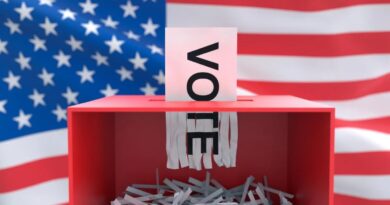Meadows pressed DOJ to investigate conspiracy theories and debunked claims of election fraud

WASHINGTON — In Donald Trump’s final weeks in office, Mark Meadows, his chief of staff, repeatedly pushed the Justice Department to investigate conspiracy theories about the 2020 presidential election, according to newly uncovered emails provided to Congress, portions of which were reviewed by The New York Times.
In five emails sent during the last week of December and early January, Meadows asked Jeffrey Rosen, then the acting attorney general, to examine debunked claims of election fraud in New Mexico and an array of baseless conspiracies that held that Trump had been the victor. That included a fantastical theory that people in Italy had used military technology and satellites to remotely tamper with U.S. voting machines and switch votes for Trump to votes for Joe Biden.
None of the emails show Rosen agreeing to open the investigations suggested by Meadows, and former officials and people close to him said that he did not do so. An email to another Justice Department official indicated that Rosen had refused to broker a meeting between the FBI and a man who had posted videos online promoting the Italy conspiracy theory, known as Italygate.
But the communications between Meadows and Rosen, which have not previously been reported, show the increasingly urgent efforts by Trump and his allies during his last days in office to find some way to undermine, or even nullify, the election results while he still had control of the government.
Trump chose Meadows, an ultraconservative congressman from North Carolina, to serve as his fourth and final chief of staff in March 2020. A founder of the hard-right Freedom Caucus, Meadows was among Trump’s most loyal and vocal defenders on Capitol Hill and had been a fierce critic of the Russia investigation.
Meadows’ involvement in the former president’s attack on the election results was broadly known at the time.
In the days before Christmas, as Trump pressed the lead investigator for Georgia’s secretary of state to find “dishonesty,” Meadows made a surprise visit to Cobb County, Georgia, to view an election audit in process. Local officials called it a stunt that “smelled of desperation,” as investigations had not found evidence of widespread fraud.
Meadows also joined the phone call that Trump made Jan. 2 to Brad Raffensperger, Georgia’s Republican secretary of state, in which Trump repeatedly urged the state’s top elections official to alter the outcome of the presidential vote.
Yet the newly unearthed messages show how Meadows’ private efforts veered into the realm of the outlandish and sought official validation for misinformation that was circulating rampantly among Trump’s supporters. Italygate was among several unfounded conspiracy theories surrounding the 2020 elections that caught fire on the internet before the Jan. 6 assault on the Capitol by a pro-Trump mob. Those theories fueled the belief among many of the rioters, stoked by Trump, that the election had been stolen from him and have prompted several Republican-led states to pass or propose new barriers to voting.
The emails were discovered this year as part of a Senate Judiciary Committee investigation into whether Justice Department officials were involved in efforts to reverse Trump’s election loss.
“This new evidence underscores the depths of the White House’s efforts to co-opt the department and influence the electoral vote certification,” Sen. Dick Durbin, D-Ill., chairperson of the committee, said in a statement. “I will demand all evidence of Trump’s efforts to weaponize the Justice Department in his election subversion scheme.”
A spokesperson for Meadows declined to comment, as did the Justice Department. Rosen did not respond to a request for comment.
The requests by Meadows reflect Trump’s belief that he could use the Justice Department to advance his personal agenda.
On Dec. 15, the day after it was announced that Rosen would serve as acting attorney general, Trump summoned him to the Oval Office to push the Justice Department to support lawsuits that sought to overturn his election loss. Trump also urged Rosen to appoint a special counsel to investigate Dominion Voting Systems, an election technology company.
During the weeks leading up to the Jan. 6 attack, Trump continued to push Rosen to do more to help him undermine the election and even considered replacing him as acting attorney general with a Justice Department official who seemed more amenable to using the department to violate the Constitution and change the election result.
Throughout those weeks, Rosen privately told Trump that he would prefer not to take those actions, reiterating a public statement made by his predecessor, William Barr, that the Justice Department had “not seen fraud on a scale that could have effected a different outcome in the election.”
Meadows’ outreach to Rosen was audacious in part because it violated long-standing guidelines that essentially forbid almost all White House personnel, including the chief of staff, from contacting the Justice Department about investigations or other enforcement actions.
“The Justice Department’s enforcement mechanisms should not be used for political purpose or for the personal benefit of the president. That’s the key idea that gave rise to these policies,” said Neil Eggleston, who served as President Barack Obama’s White House counsel. “If the White House is involved in an investigation, there is at least a sense that there is a political angle to it.”
Nevertheless, Meadows emailed Rosen multiple times in the end of December and on New Year’s Day.
On Jan. 1, Meadows wrote that he wanted the Justice Department to open an investigation into a discredited theory, pushed by the Trump campaign, that anomalies with signature matches in Georgia’s Fulton County had been widespread enough to change the results in Trump’s favor.
Meadows had previously forwarded Rosen an email about possible fraud in Georgia that had been written by Cleta Mitchell, a lawyer who worked with the Trump campaign. Two days after that email was sent to Rosen, Mitchell participated in the Jan. 2 phone call, during which she and Trump pushed Raffensperger to reconsider his findings that there had not been widespread voter fraud and that Biden had won. During the call, Trump asked Raffensperger to “find” him the votes necessary to declare victory in Georgia.
Meadows also sent Rosen a list of allegations of possible election wrongdoing in New Mexico, a state that Trump’s personal lawyer Rudy Giuliani had said in November was rife with fraud. A spokesperson for New Mexico’s secretary of state said at the time that its elections were secure. To confirm the accuracy of the vote, auditors in the state hand-counted random precincts.
And in his request that the Justice Department investigate the Italy conspiracy theory, Meadows sent Rosen a YouTube link to a video of Brad Johnson, a former CIA employee who had been pushing the theory in videos and statements that he posted online. After receiving the video, Rosen said in an email to another Justice Department official that he had been asked to set up a meeting between Johnson and the FBI, had refused, and had then been asked to reconsider.
The Senate Judiciary Committee is one of three entities looking into aspects of the White House’s efforts to overturn the election in the waning days of the Trump administration. The House Oversight Committee and the Justice Department’s inspector general are doing so as well.
Rosen is in talks with the oversight panel about speaking with investigators about any pressure the Justice Department faced to investigate election fraud, as well as the department’s response to the Jan. 6 attack, according to people familiar with the investigation.
He is also negotiating with the Justice Department about what he can disclose to Congress and to the inspector general given his obligation to protect the department’s interests and not interfere with current investigations, according to a person familiar with the discussions. Rosen said last month during a hearing before the oversight committee that he could not answer several questions because the department did not permit him to discuss issues covered by executive privilege.
Durbin opened his inquiry in response to a Times article documenting how Jeffrey Clark, a top Justice Department official who had found favor with Trump, had pushed the Justice Department to investigate unfounded election fraud claims. The effort almost ended in Rosen’s ouster.
Last month, Durbin asked the National Archives for any communications involving White House officials, and between the White House and any person at the Justice Department, concerning efforts to subvert the election, according to a letter obtained by The Times. He also asked for records related to meetings between White House and department employees.
The National Archives stores correspondence and documents generated by past administrations.
This article originally appeared in The New York Times.

